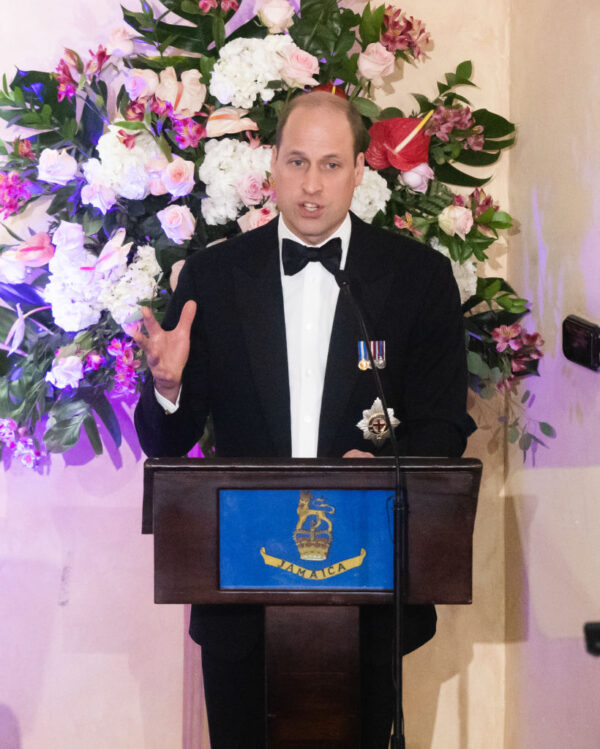Prince William denounced slavery during a dinner with Jamaican officials on March 23, but advocates who called for an apology and reparations from the royal family and the British government for years of enslavement and colonization said it was insufficient.
The Duke and Duchess of Cambridge visited the nation island as part of a week-long tour to celebrate Queen Elizabeth II’s 70th anniversary of her coronation. The visit to Jamaica was upended by protests on March 22 and a letter demanding the prince apologizes and compensates Jamaica’s African diaspora. The letter from The Advocates Network was accompanied with a list of 60 reasons why reparations and an apology are warranted.

“I strongly agree with my father, the Prince of Wales, who said in Barbados last year that the appalling atrocity of slavery forever stains our history,” William said during the dinner hosted by Jamaica’s governor general. “I want to express my profound sorrow. Slavery was abhorrent, and it should never have happened.”
According to reports, about 600,000 Africans were enslaved in Jamaica under more than 300 years of British rule. William’s father, Prince Charles, made the formal apology during a speech at a ceremony in November marking the smaller Caribbean island’s transition to a republic. Research shows more than 300,000 Africans were enslaved in Barbados.
One hundred members of The Advocates Network wanted William to apologize for slavery in Jamaica and its residual effects on the descendants of the enslaved and the diaspora. The group said the prince’s remarks were tone-deaf. He was not remorseful or apologetic, and it took little effort to repeat his father’s words, the group added. The biggest blow, the advocates said, was there was no mention of reparations.
Those seeking reparations argue Britain and the royal family financially. benefited from the free labor and the hardship of enslave Africans. Britain borrowed £20 million to reimburse slaveowners for the lost of “human property” when slavery was abolished. British taxpayers, including descendants enslaved Africans, did not pay off the loan until 2015. It is equivalent to £17bn or $18.7 billion in today’s money, according to historian David Olusoga.
“Prince William’s statement is not an apology! The expression of “profound sorrow” is unacceptable,” the group said in a statement. “It is merely an acknowledgment that slavery was abhorrent. A bad thing that all well-thinking persons would condemn. There was no responsibility taken! No call out of centuries of British bloody conquest and plunder. No call out of the dehumanization and exploitation.”
The Advocates Network said William’s response to its demands has strengthened the group’s push for Jamaica to cut ties with the British monarchy.
“This must be on terms that will put power in the hands of the Jamaican people and complete the decolonization process,” the group said.
Jamaica gained its independence from Britain in August 1962 and is considered a constitutional monarchy, where the country makes it own laws and holds elections. It’s parliamentary and legal system mirrors the British and the queen is the head of state. She is represented on the island by the country’s governor general.
Converting to a republic removes the queen as the executive authority. Jamaica will most likely select a president as head of state and eliminate the governor general, according to political pundits.
Jamaican-American social commentator Richard Blackford said Jamaica has been considering the transition at least as far back as the 1970s when the island was at the height of “consciousness.”
“We had a quasi-Democratic socialist government through Michael Manley who seemed to have been heading in the direction of getting rid of the monarchy,” Blackford said. At that time, the proposal included replacing the judicial system with a “Caribbean Court.”
Blackford said being under the British monarchy provides limited benefits for Jamaicans and is redundant.
“As a country being independent, you’re saying to your people, we’re responsible for ourselves,” Blackford said. “We’re subject to the same people who enslaved us and made so much money off our backs. There’s no reason why you’re saying you’re an independent country, but your political system still answers to that system.”
Jamaica Prime Minister Andrew Holness declared the country’s intention to become a republic to William ahead of the formal dinner. Holness has appointed a former attorney general to oversee the process. Jamaica’s National Council on Reparation is also working on a plan. The prime minister’s office told reporters that there is disagreement among political leaders about a president’s role under a republic.
“Jamaica is a very free and liberal country, and the people are very expressive. And I am certain that you would have seen the spectrum of expression yesterday,” Holness said. “There are issues here which are, as you would know, unresolved, but your presence gives an opportunity for those issues to be placed in context, put front and center and to be addressed as best as we can.”
“We are moving on,” he said. “We intend to attain in short order our developing goals and fulfill our true ambitions and destiny as an independent, developed, prosperous country.”
The Jamaican Parliament would have to approve the transition with a two-thirds vote in both houses.


